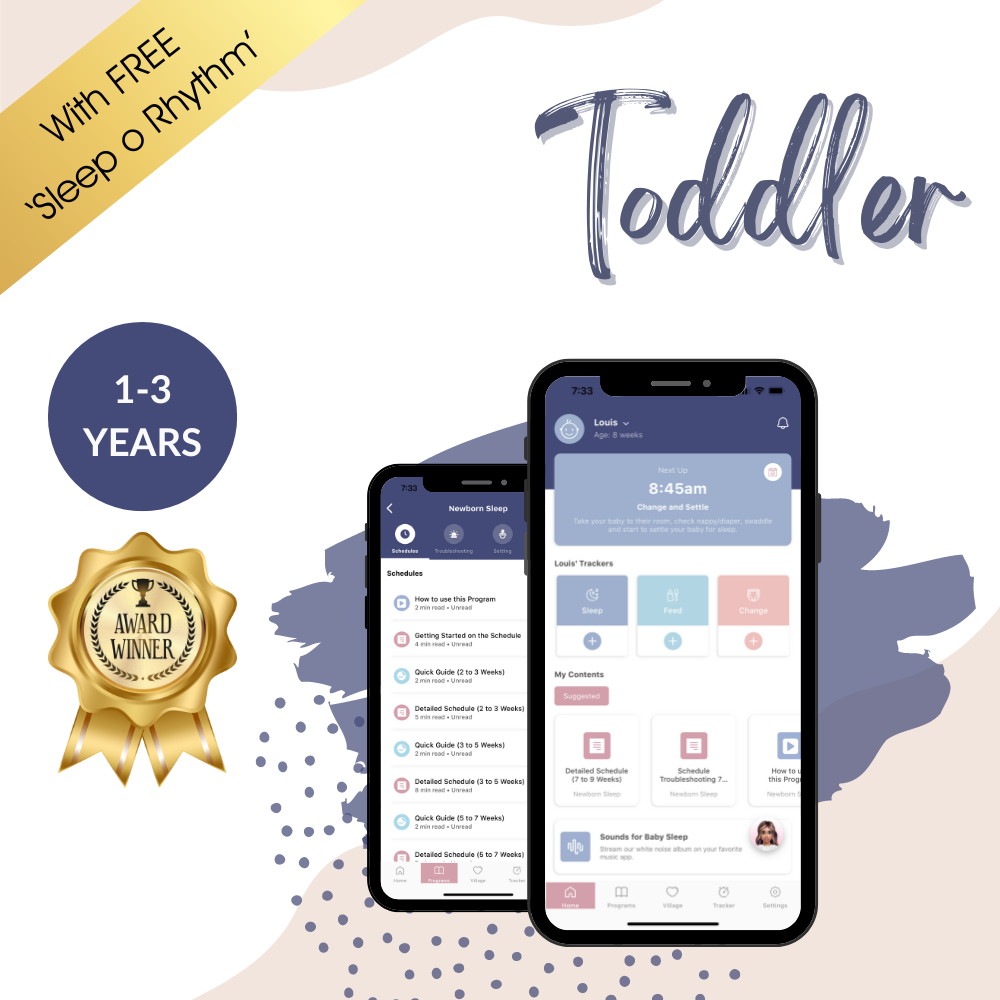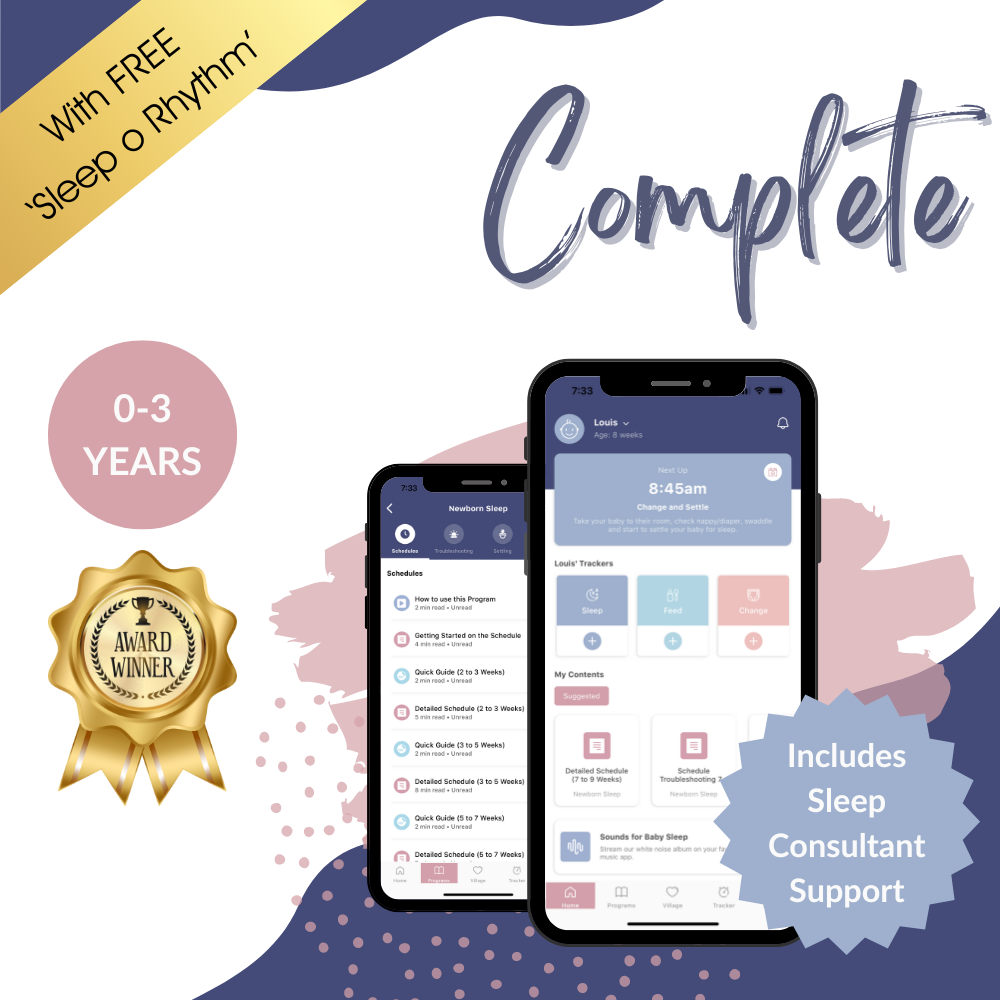
The circadian rhythm in babies (4 ways to boost sleep)
You might have heard us talking about having a totally dark room for baby's naps and night time sleep. Or, perhaps you've seen that we suggest waking your baby at the same time every morning. Some people may think this all sounds a bit extreme but we have very good reasons for these recommendations and they all stem from our physiology as humans.
In this article:
- Understanding the circadian rhythm (aka the body clock)
- Light, melatonin and sleep
- 4 ways to help your baby's circadian rhythm and boost sleep
Yes, I want more sleep!
If you need a helping hand with tackling your baby’s sleep, then check out our Pediatrician-recommended Sleep Programs.
Get our Sleep Programs
Understanding the circadian rhythm (aka the body clock)
Human beings are mammals and, as such, we are governed by a set of elemental "rules" just like any other mammal. That is, our bodies, on a primal level, react and respond to natural cues in our environment (called zeitgebers) and these cues allow our circadian rhythm, or body clock, to function properly.
The biological processes that we go through day to day - processes such as waking up, feeling hungry, getting tired or going to sleep - are controlled by a complex network of hormones and chemicals. These hormones and chemicals are produced and released at different times of the day, in response to things like light and dark, hot and cold and, of course, time. After all, it's called a body "clock" for a reason!
Light, melatonin and sleep
The way that humans used to live (and the way that some traditional cultures still live today), was far better suited to how our bodies and brains are designed to function, than the way we live today in more modern civilisations.
Without the ability to artificially create and extend daytime with electric lights, we would have woken with the rising of the sun around about the same time each day (sunlight being one of the key body clock triggers). Then, as the day wore on and the sun started to set, we were naturally exposed to diminishing light and this allowed the gradual rise of certain hormone levels in our body.
As the sun vanished, our core body temperatures would then start to lower, further signalling to our body clock that night was approaching and, as a result, we would start getting sleepy. Once it was dark, we would sleep. At about the same time each day. And we would sleep well... largely thanks to the sleep hormone melatonin.
Melatonin is the hormone that helps us fall asleep and stay asleep and it is only produced in the dark. It continues to be pumped through our bodies until midnight, after which levels start to fall. By the time we wake up, the melatonin is completely gone from our system, and we are ready to start our day.
This is how humans are built to operate. As organic beings, we are (well, we should be) totally in tune with the natural rhythm of the world around us.
The problem is, these days, our body clocks are broken. Through technology and invention, we have managed to outsmart our biology! We no longer respond to the sun going down in a physiological way - we simply turn on the lights to extend daytime.
This in itself instantly halts the natural process our bodies should be going through to prepare for sleep and all those sleep hormones are put on hold. Our busy lives today also means that we have quite varied wake times and bedtimes - there's no consistency anymore. And this is partly why there are so many sleep problems today in adults and children alike.
4 ways to help your baby’s circadian rhythm
So, how can we help our babies (and maybe even ourselves) to get our circadian rhythms back in sync with nature?
1. We can recreate a cave.
So to speak. We can create a nice, dark environment for sleep, which we know promotes good sleep and the release of those all important sleep hormones like melatonin. It has been proven that sleeping your baby in a very dark room leads to easier settling and longer naps. Even using a night light can be too stimulating for your little one and inhibit their ability to settle well.
We can create a "cave" for daytime naps as well as night time sleep with the use of blackout blinds - ensuring our babies have the best chance of a decent, restorative rest. A dark room also makes it easier for your baby to drift between sleep cycles, without waking fully (this becomes especially important from around 8 weeks of age - read THIS article to find out why!).
2. Let the natural light in.
When your baby wakes in the morning (or when you wake them), open the curtains and let the natural light signal to their body clock that it's daytime. This will help lock in a more consistent morning wake time to help "set" their body clock.
Say goodbye to sleepless nights.
Join over 800,000 families worldwide who are enjoying excellent sleep with our Sleep Programs, created by experts in the field of pediatric sleep.
Get our Sleep Programs
If your baby has an early morning waking habit, it might actually be caused by sunlight in the first place, so check your baby's curtains aren't letting any light through at 5am. While we want to be as biologically responsive as we can when it comes to baby sleep, in our modern lives, 5am isn't always a reasonable time for the household to wake!
3. Dim the lights in the evening.
A good way to help your baby get ready for sleep is to lean in to the natural process of going to sleep. Resisting turning on the lights in the early evening and having some quiet wind-down time before bed is a great way to help keep your baby's body clock counting down to bedtime and a good night's sleep.
4. Establish a consistent routine.
As well as the light and the dark, our body clocks have traditionally been regulated by predictable activities, such as regular meal times or regular patterns or activities in our day. In other words, a consistent and predictable routine.
Some parents feel it's unnatural to follow a routine and prefer to "go with the flow", letting their baby dictate the pattern of the day. But when you look at the way our ancestors used to live, they had very structured routines in their day. Waking with the sun, eating together, hunting, stopping for food at specific times. Their days were predictable; they were incredibly routine.
Their babies would have been waking and sleeping at roughly the same times each day, simply due to the circadian rhythm of their people, who operated in this way because it's what they needed to do to survive. It was actually a far more structured and predictable way of life than we have in modern society. And it reinforces why babies and children thrive on a predictable routine - it is how we are built as human beings.
And it's how we've written our Sleep Programs too. We understand your baby's biological sleep processes and our Programs work with the natural rhythm of your baby's day. This incudes aiming for consistent morning wake times and bedtimes, harnessing that biological need for predictability, in order to effectively "set" our somewhat broken body clocks.
_________
References:
Iwata S, Fujita F, Kinoshita M, Unno M, Horinouchi T, Morokuma S, Iwata O. Dependence of nighttime sleep duration in one-month-old infants on alterations in natural and artificial photoperiod. Sci Rep. 2017 Mar 17;7:44749. doi: 10.1038/srep44749. PubMed PMID: 28303945; PubMed Central PMCID: PMC5355994.
Mindell JA, Li AM, Sadeh A, Kwon R, Goh DY. Bedtime routines for young children: a dose-dependent association with sleep outcomes. Sleep. 2015 May 1;38(5):717-22. doi: 10.5665/sleep.4662. PubMed PMID: 25325483; PubMed Central PMCID: PMC4402657.
Coons S, Guilleminault C. Development of consolidated sleep and wakeful periods in relation to the day/night cycle in infancy. Dev Med Child Neurol. 1984 Apr;26(2):169-76. PubMed PMID: 6724155.
Small, M. F (1998). Our Babies, Ourselves: how biology and culture shape the way we parent. Random House: Anchor Books.
___________

Receive product and services updates, promotional offers and other marketing communications based.





